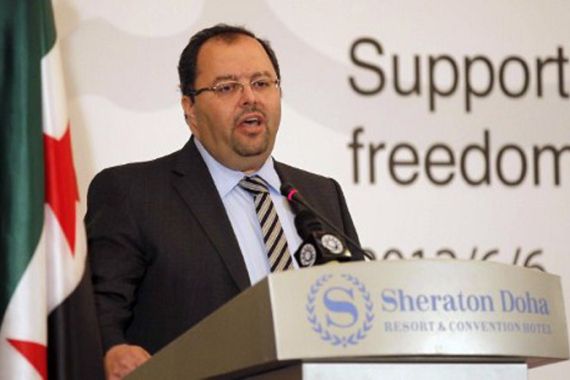Fund launched to back Syrian rebels
Syrian businessmen creates $300m fund based in Doha to help rebel forces, as violence continues across the country.

Syrian businessmen living abroad have created a $300m fund to support rebels fighting forces of President Bashar al-Assad, opposition activists announced.
“This fund has been established to support all components of the revolution in Syria, and to establish a strong relationship with businessmen inside and outside Syria and to protect civilians,” Wael Merza, secretary-general of the opposition Syrian National Council (SNC), said on Wednesday in the Qatari capital, Doha.
Merza said that about $150m had already been spent, some of which were contributions to the rebel Free Syrian
Army (FSA).
“The majority of support given [to the rebels] will be on the technical side,” Merza said. “It’s also logistical support
to our people on the ground.”
“Yes, we supported the Free [Syrian] Army to protect civilians,” Mustafa Sabbagh, president newly formed Syrian
Business Forum of businessmen in exile, said.
The fund will be based in Doha, Merza said. He also hinted at strong financial support from Gulf Arab states for the new fund.
“We are going to see distinct support of this fund from neighbours in a very clear manner, in a matter of weeks. We
expect Qatar to play a major role,” he said.
Al Jazeera’s Hoda Abdel Hamid, reporting from the conference in Doha, said the move by the elite businessmen was pivotal because they had once been a backbone of support for the government.
“It is significant because since the beginning of uprising in Syria, the Syrian government said it had been very strong because it had the support of the business community,” she said.
“One businessman here told me that by doing this they are actually pulling the carpet from under the feet of the regime, not only because they are not supporting the leadership anymore, but because they are hoping to give a signal to Syrians to raise their voices to help accelerate the fall of the regime.”
Latakia attacks
Syrian security forces killed at least three people on Wednesday after opening fire on demonstrations in the towns of Sheikh Issa, Hreitan and Aleppo city, the provincial capital, according to the Syrian Observatory for Human Rights (SOHR), a UK-based activist group.
Aleppo, Syria’s main trade and financial centre that had also been largely quiet allegedly because it was a stronghold of support for Assad, has seen a significant rise in anti-government protests in recent months.
At Aleppo University, where massive anti-government protests have persisted since the uprising began in March last year, fresh demonstrations were reportedly crushed by security forces, who arrested a number of students.
Similar to Aleppo, Latakia is also seeing a serious increase in dissent.
Government forces used tanks and attack helicopters to continue shelling towns in Latakia for a second day, killing at least six people on Wednesday.
The attacks, which killed a family of three in al-Shirqaq and another three people in al-Heffa, came a day after about 33 people were killed during clashes between soldiers and army defectors in the province.
At least 22 troops, nine defectors, and two civilians were killed in the fighting on Thursday in Latakia, the Syrian Observatory for Human Rights reported.
The SNC called on “UN observers to go to the town of al-Heffa immediately, in order to prevent a new massacre”.
Separately, members of the FSA stepped up their offensive in Damascus, the Syrian capital, as well as in other parts of the country.
“Violent clashes broke out in Harasta between regime troops and rebel forces,” the SOHR said, referring to a northern suburb of Damascus.
The fighters also reportedly attacked checkpoints near Douma, Irbin and Zamalka, all in Damascus province.
In the southern province of Deraa, at least three soldiers were killed and eight others wounded in violent clashes between troops and FSA members in the area of Lajat. It occurred as government forces launched raids and arrests in the village of Nafaa.
New PM announced
The unrest took place as Syrian state television said Assad had named a former agriculture minister, Riyad Hijab, as prime minister to form a new government.
The appointment came after a new parliament was voted in on May 7 in elections boycotted by opposition groups.
Speaking to Al Jazeera, Nabil Samman, the head of the Centre for Research and Documentation in Damascus, said the appointment of Hijab was merely “an administrative process”, echoing the views of most of Syria’s opposition.
“Even though Article 8 of the constitution [which declared the ruling Baath Party as the leader of the state and society] has been scrapped, the prime minister is a Baathist and the parliament is dominated by Baath members,” he said.
“I do not expect any changes in the political scene in Syria as the sanctions continued to drain the economy and Assad declared he will resume his military campaign to crush the opposition.”
France also criticised the appointment by accusing the Syrian government of staging elections that were a “pretence”.
Bernard Valero, French foreign ministry spokesman, said that Assad “remains stubbornly deaf to the demands of his people” and that the appointment of a new premier “constitutes a new evasion, a masquerade”.
Meanwhile, Italy’s foreign minister said that the Syrian government’s crackdown on dissent could result in genocide unless there is swift intervention.
Giulio Terzi said during a parliament hearing on Wednesday that “the strategy of Damascus risks causing a genocide without rapid intervention”.
The Syrian leadership “is fighting for its survival with an ever more direct and brutal escalation, with terror against the civilian population and with the artificial fueling of internal conflict,” Terzi said.